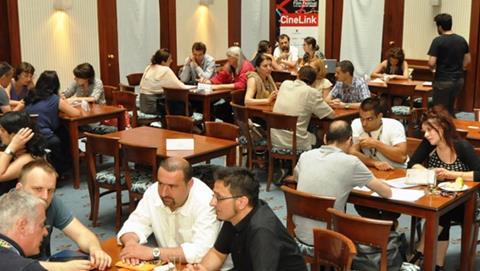Regional exhibition in the spotlight at Sarajevo Film Festival’s CineLink.

This year’s Avant Premiere strand of Sarajevo Film Festival’s CineLink industry programme, which offers attendees insight into regional film activity, put the spotlight on the development of the exhibition sector in Southeast Europe.
Held in collaboration with European exhibition network Europa Cinemas, the Avant Premiere Lab consisted of workshops for regional exhibitors from both multiplexes and independent cinemas, with the aim of helping them to develop audiences and to promote cinema-going as the primary channel for consuming films.
Speaker Javier Pachon, president of Spanish arthouse cinema network CineArte, and director of Mallorca-based indie cinema CineCiutat, described how his location had managed to survive the decline of indie cinemas in Spain, which he said had seen the number of theatres drop by 35% between the years 2005 and 2015.
“Go where the attention is,” he said, referencing the fact that the 400,000 inhabitants of Palma, Mallorca’s capital and where CineCiutat is based, had been left facing the possibility of having no arthouse cinema before the CineCiutat venue was opened.
The venue relies on a series of social networks to promote itself, but Pachon also emphasised the necessity of employing a varied series of communications channels; to reach older consumers, a cinema should look at utilising community radio or newspapers, for example.
Nina Peče, director of Kinodvor, a cinema in Slovenian capital Ljubljana, agreed that bespoke approaches were key to tapping into different types of audiences. Her cinema has built up a reputation for a personalised approach, notably including a series of custom-made trailers it used for the release of Richard Linklater’s Boyhood that targeted individual age groups in accordance with the different generations depicted in the movie.
Making your cinema a brand is a crucial long-term strategy, she said, and that comes with both recognisable programming and constant interaction with audiences.
“It’s not necessary that everybody likes all the films that we show, but it is very important that we can stand for what we show, and that we know it is a quality film, regardless of taste,” commented Peče.
“We are happy to enter into dialogue with press and critics, and this becomes another promotional and marketing tool,” she continued.
Film festivals also play a crucial role in building arthouse cinema audiences, she said.
“It is much easier and cheaper to develop audiences if you partner with festivals, and engage with them for promotional campaigns,” Peče explained. Kinodvor is a partner venue for almost all festivals taking place in Ljubljana, including the biggest one, the Ljubljana International Film Festival.
By using this approach, cinemas can create audiences who visit the venue because they trust its programming, rather than just to see a specific film.
“We had people coming in and saying, ‘What do you have? I’m feeling low today’. It almost feels like we are running a bar, and regular clientele is what bars live off,” said Puchon.
The Avant Premiere Lab also featured a presentation of International Film Festival Rotterdam’s IFFR Live initiative, which expands the live festival experience through the use of new technologies and social media, and with a showcase of Secret Arts Cinema, a programme in Croatia which introduces specialised documentary films about architecture, design and crafts to relevant consumers.
























No comments yet